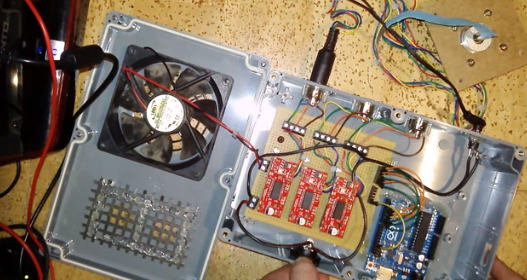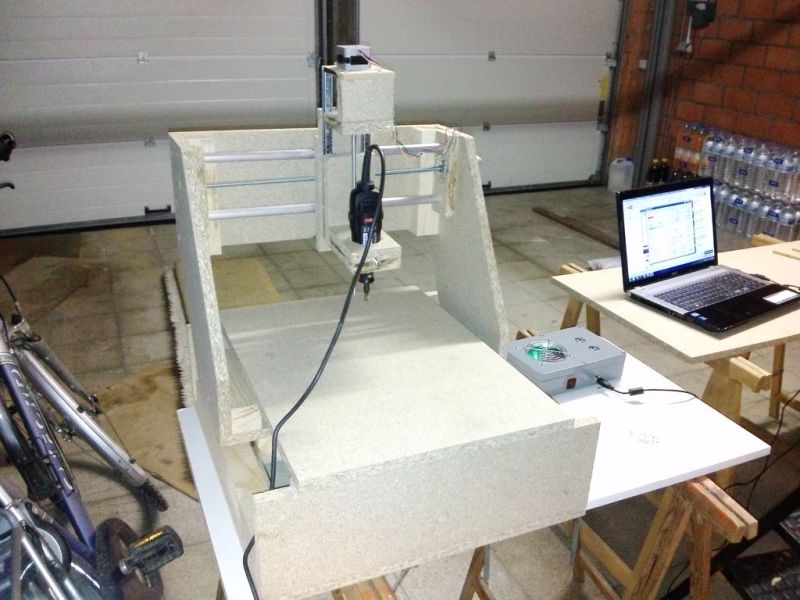[siemen] has entered the wonderful world of Hobby CNC with his low-buck build of this gantry-style router. It embodies everything we here at HaD love: resourcefulness, perseverance and results. [siemen] has designed his frame using ideas he has found while surfing around the ‘net and is made entirely out of particle board. For linear movement, the Y and Z axes rely on ball bearing drawer slides while the X axis use a pipe and skate bearing arrangement. NEMA 17 stepper motors coupled to threaded rod move each axis.
The electronics are packaged in a nice little project box which houses an Arduino and 3 Sparkfun EasyStepper stepper motor drivers. [siemen] also cut a hole in the project box and installed a fan in order to keep those motor drivers cool. The Arduino is flashed with the CNC machine controller called GRBL. GRBL takes g-code sent from a PC to the Arduino and then in turn sends the required step and direction signals to the stepper motor drivers.
Overall, [siemen] did a great job with his first CNC project which came in at 200 Euro ($240). He’s currently working on version 2 and we are looking forward to covering it when it’s done. If you dig this project, you may also like this wooden wood router or this bolt-together one.

















Jesus. At least use thick plywood instead of the chipboard! The price is almost same, but it is much more stable, stronger, stiffer and also lighter. The British bomber Mosquito was build from plywood …
Use right angle plywood joints for stiffness in both axes
Also use epoxy instead of PVA as the PVA is a bit plasticy …
What about the ‘acoustic deadness’ of MFD? Ideally that would dampen vibrations.
Not sure, but dumping the vibrations by the CNC body mean something is moving and is not stiff enough. Not good for accuracy with hard materials like metals.
darn it, we were all expecting to machine hardened steel from a CNC machine made of wood
actually the thick plywood with right angle T shape trusses with epoxy can be quite stiff; and lighter than steel/aluminium for the same strength; probably similiar stiffness
from the composite point of view the hard plywood is somewhere between fibreglass and carbon fibre; just the water resistance can be pure … plus voids in the wood
also if you are fed up with your CNC you can make an evening barbeque …
yeah go ahead, put particle board in the camp fire, make sure you tell the paramedics what you did
I remember these techniques from the early reprap days, apparently the drawer sliders get sloppy over time. The skate bearings tend to grind a flat on the rod, one that is more pronounced in the middle of the rod. You can twist the rod in place a couple of times to extend life. That’s why reprap moved towards using LM8UU bearings. For a CNC you could maybe get away with LM10UU or SBR12. Even then it is my slightly uneducated guess that the wood would start to creep around the bolt holes over time if you are cutting metal.
not to say this isn’t impressive.
Some people only read what’s in front of there face , if you (damik) klick links you would have known that it’s already 1 year old , and for a 18 year old students first build it will inspire other joung people .
Do not look at the wood look at the electronics i’m sure his next will be better
grtz
strik
what’s a shame is putting so much work and love into a machine that might be strong enough to carve a chocolate easter bunny
Drawer sliders can flex a fair amount when you put forces on them. The only vector where they are reasonable accurate is the sliding motion. These sliders will go up and down and wrench by quite a large amount in other directions.
I know the sliders will work for some applications, my small CNC has sliders for moving the bed, but anything heavier than PCB etching and the bed goes all wonky.
.. and the bushings + rails don’t cost that much.. For example:
http://www.ebay.com/itm/SCS8UU-LM8UU-8mm-Linear-Motion-Ball-Bearing-Slide-Unit-Bushing-/161109240131?pt=LH_DefaultDomain_0&hash=item2582dbe943
and
http://www.ebay.com/itm/1PCS-8mm-Outer-Diameter-Shaft-Optical-Axis-Cylinder-Linear-Rail-Series-/271404988811?pt=LH_DefaultDomain_0&var=&hash=item3f30ff798b
Few bucks more and you get “decent” sliders.
This is probably why this site is called “hack”aday and not “well-engineeredgoodparts”aday. Granted, spending 200 euros is a bit more than hacking — a lot of stuff could be scavenged from old printers, copiers, and various other castoffs that would probably work as well for a lot cheaper. But I love seeing inventiveness.
I built mine that way, along with using some good $lider$, plywood and MDF scraps, old Laserjet steppers, aluminum bits from a scrapyard, a power supply from an old film developer, and a good controller, but if you just want to hack up something quick, or even something in between a hack and pro-grade machine, there are lots of options. It works quite well on wood which was my intent. And mine could be scavenged for a better build at some point, so, most of the pricey bits could be used again.
flatbed scanners and dot matrix printers have some good linear slides, though the stiffness/strength is somewhat wanting as both are meant to be low-force axes, but I’m imagining a system with a combination slide using a skate bearing for load carrying with a metal rail underneath and a salvaged axis for linear accuracy
The 200 euro is peanuts if you think about the know how he collected at his age
I invite him (all) to surge for the UHU DC closeloop drivers to take it the next level my processors where numbered 303/304/305 so wright at the start. Don’t exactly know how many there are worldwide now days , but must be over 3.000 UHU is German but well known in the USA
And yes ,, i’m Belgian to reading cince 2 years here , only posting to keep my English a bit on level
grtz
strik
With hack, I think they mean hacking, not hack jobs.
If you expect a forum where everybody will be going “OMG, yr da greatest, this is awesomest 3v3rrrrr” Then you are on the wrong intarnets.
It’s a fine build, fairly well documented and perfectly confined within the spectrum of what I generally would call a hack (which is quite a broad spectrum actually). This does, however, not mean that it is exempt from comments, critiques and opinions.
Trying to build it from hardware store parts is a fun hack, but pointing out that there are cheap ways to do it better also is part of this blog/forum/community deal.
Some people don’t do ebay you know.
Oh, a Kleinmill! I haven’t seen one of those in nearly a decade. John Kleinbauer sold a few plans to build machines that worked on these same principles. I still have my printed KleinMill II plans in a junk box in the closet.
Two years ago, i started making my own C.N
C machine,which unfortunately lies incomplete somewhere in Nairobi. For some medical reason, i was not able to finish my machine which i had made exactly like this! every bit.